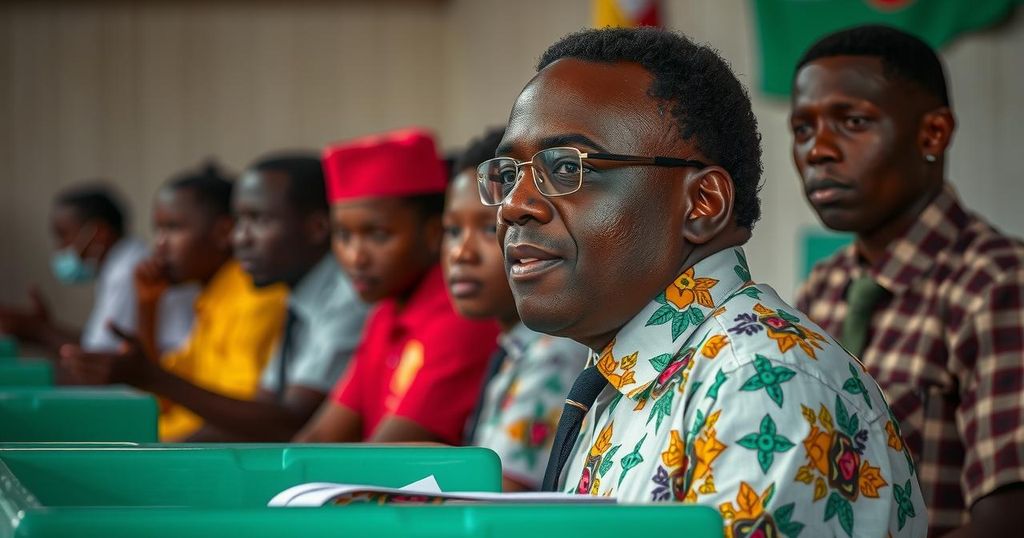The 2023 Ghanaian elections are set to be highly competitive with former President John Mahama challenging current Vice President Mahamudu Bawumia. While Mahama proposes a 24-hour economy to enhance job creation, Bawumia emphasizes support for the economy amid recent challenges. Voter dissatisfaction with the dominant parties exists, with some expressing a desire for alternatives as key issues such as the economy and corruption take center stage.
Ghana is poised for a highly competitive election on December 7, where former President John Mahama of the National Democratic Congress stands as a significant contender against Mahamudu Bawumia, the ruling party’s candidate and current Vice President. Mahama has pledged to create a 24-hour business environment to stimulate job growth and forge a path for economic recovery from a troubling $30 billion external debt default in 2022, while Bawumia emphasizes his commitment to economic resilience despite post-COVID challenges.
Since democratization in 1992, Ghana has been primarily governed by either the National Democratic Congress (NDC) or the New Patriotic Party (NPP), a pattern that is not anticipated to shift markedly this year, according to University of Ghana’s Kwame Asah Asante. Candidates from smaller parties historically struggle to gain more than 5% in collective votes, although they may influence the elections by pushing for a runoff. Voter sentiment appears mixed; many citizens express a desire for change, citing dissatisfaction with the perennial dominance of the two major parties.
In Accra, campaign billboards herald the candidates, and excitement is tangible among voters. Some, like Angela Ofori, attract attention as undecided constituents seeking alternatives to the long-established political duel. Others note the rise of independent candidates such as Nana Kwame Bediako, popularly known as Cheddar, who focuses on appealing to younger voters with visionary policies, though his electoral impact remains uncertain.
The key issues confronting voters include infrastructure, education, health care, corruption, and notably, the economy. Ghana, which ranks as the world’s second-largest cocoa producer, faces a challenging economic landscape following its 2022 debt default, exacerbated by the COVID-19 pandemic and disruptions in grain supplies due to the war in Ukraine. Taden claims that pressing economic issues, including a staggering inflation rate and protests against illegal mining activities, have prompted voters to critically evaluate their options. Asante notes that the current economic conditions significantly influence the election, particularly considering the historical relationship between economic performance and electoral outcomes.
Additionally, sentiments from voters highlight a divide between those advocating for Mahama’s proposals to transform the economy and those supporting Bawumia, who has been recognized for implementing progressive digitization policies aimed at modernizing the economy and enhancing governmental efficiency. While some voters like Wisdom Gavor express urgency and a desire for systemic change, others like Ivan Duke laud the NPP’s achievements in digitization.
Despite facing various economic and political challenges, Ghana’s democratic processes remain robust, suggesting a highly competitive electoral outcome.
Ghana is a beacon of democracy in West Africa, having embraced democratic governance since 1992. The political landscape has largely been defined by two principal parties: the National Democratic Congress (NDC) and the New Patriotic Party (NPP). This election season is particularly critical as the nation confronts economic hardships exacerbated by external debt issues and the fallout from the COVID-19 pandemic. The electorate appears increasingly restless, with a segment desiring change from the traditional party system.
The upcoming elections in Ghana reflect a critical juncture in the nation’s democratic journey. With former President Mahama challenging Vice President Bawumia, the race is expected to illuminate public sentiment towards economic management and governance. As the electorate grapples with pressing issues such as inflation and economic recovery, the candidates’ platforms on job creation, infrastructure, and digital transformation will be pivotal in influencing voter turnout. Ultimately, the election presents an opportunity for citizens to express their desires for change, stability, and growth in a democratically significant manner.
Original Source: www.voanews.com







